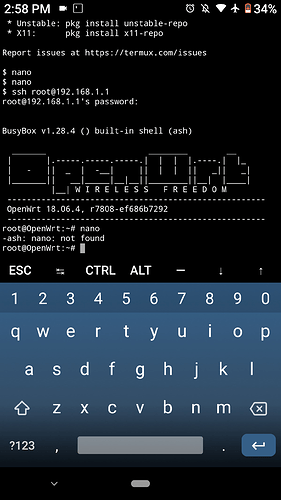This my setup:
BusyBox v1.28.4 () built-in shell (ash)
_______ ________ __
| |.-----.-----.-----.| | | |.----.| |_
| - || _ | -__| || | | || _|| _|
|_______|| __|_____|__|__||________||__| |____|
|__| W I R E L E S S F R E E D O M
-----------------------------------------------------
OpenWrt 18.06.4, r7808-ef686b7292
-----------------------------------------------------
root@OpenWrt:~# cat /etc/config/sqm
config queue 'eth1'
option enabled '1'
option debug_logging '0'
option qdisc 'cake'
option interface 'eth0.2'
option download '170000'
option upload '29750'
option verbosity '0'
option qdisc_advanced '0'
option script 'test_WAN_triple-isolate__piece_of
_cake.qos'
option linklayer 'ethernet'
option overhead '44'
root@OpenWrt:~# tc -s qdisc
qdisc noqueue 0: dev lo root refcnt 2
Sent 0 bytes 0 pkt (dropped 0, overlimits 0 requeues 0)
backlog 0b 0p requeues 0
qdisc mq 0: dev eth0 root
Sent 536335044 bytes 1677866 pkt (dropped 0, overlimits
0 requeues 8)
backlog 0b 0p requeues 8
qdisc fq_codel 0: dev eth0 parent :1 limit 10240p flows
1024 quantum 1514 target 5.0ms interval 100.0ms memory_l
imit 4Mb ecn
Sent 536335044 bytes 1677866 pkt (dropped 0, overlimits
0 requeues 8)
backlog 0b 0p requeues 8
maxpacket 1448 drop_overlimit 0 new_flow_count 10 ecn_
mark 0
new_flows_len 0 old_flows_len 0
qdisc mq 0: dev eth1 root
Sent 792878954 bytes 1234298 pkt (dropped 5, overlimits
0 requeues 32)
backlog 0b 0p requeues 32
qdisc fq_codel 0: dev eth1 parent :1 limit 10240p flows
1024 quantum 1514 target 5.0ms interval 100.0ms memory_l
imit 4Mb ecn
Sent 792878954 bytes 1234298 pkt (dropped 5, overlimits
0 requeues 32)
backlog 0b 0p requeues 32
maxpacket 1514 drop_overlimit 0 new_flow_count 17 ecn_
mark 0
new_flows_len 0 old_flows_len 0
qdisc noqueue 0: dev br-lan root refcnt 2
Sent 0 bytes 0 pkt (dropped 0, overlimits 0 requeues 0)
backlog 0b 0p requeues 0
qdisc noqueue 0: dev eth1.1 root refcnt 2
Sent 0 bytes 0 pkt (dropped 0, overlimits 0 requeues 0)
backlog 0b 0p requeues 0
qdisc cake 8004: dev eth0.2 root refcnt 2 bandwidth 2975
0Kbit besteffort triple-isolate nonat nowash no-ack-filt
er split-gso rtt 100.0ms noatm overhead 44
Sent 536332750 bytes 1677850 pkt (dropped 5307, overlim
its 220164 requeues 0)
backlog 0b 0p requeues 0
memory used: 645248b of 4Mb
capacity estimate: 29750Kbit
min/max network layer size: 28 / 1500
min/max overhead-adjusted size: 72 / 1544
average network hdr offset: 14
Tin 0
thresh 29750Kbit
target 5.0ms
interval 100.0ms
pk_delay 4.0ms
av_delay 247us
sp_delay 3us
backlog 0b
pkts 1683157
bytes 544013359
way_inds 1765
way_miss 12689
way_cols 0
drops 5307
marks 0
ack_drop 0
sp_flows 1
bk_flows 1
un_flows 0
max_len 30280
quantum 907
qdisc ingress ffff: dev eth0.2 parent ffff:fff1 --------
--------
Sent 1489279182 bytes 2490796 pkt (dropped 0, overlimit
s 0 requeues 0)
backlog 0b 0p requeues 0
qdisc noqueue 0: dev wlan1 root refcnt 2
Sent 0 bytes 0 pkt (dropped 0, overlimits 0 requeues 0)
backlog 0b 0p requeues 0
qdisc cake 8005: dev ifb4eth0.2 root refcnt 2 bandwidth
170Mbit besteffort triple-isolate nonat nowash no-ack-fi
lter split-gso rtt 100.0ms noatm overhead 44
Sent 1533207470 bytes 2490793 pkt (dropped 3, overlimit
s 329473 requeues 0)
backlog 0b 0p requeues 0
memory used: 68Kb of 8500000b
capacity estimate: 170Mbit
min/max network layer size: 46 / 1500
min/max overhead-adjusted size: 90 / 1544
average network hdr offset: 14
Tin 0
thresh 170Mbit
target 5.0ms
interval 100.0ms
pk_delay 23us
av_delay 7us
sp_delay 1us
backlog 0b
pkts 2490796
bytes 1533211890
way_inds 2043
way_miss 12566
way_cols 0
drops 3
marks 0
ack_drop 0
sp_flows 0
bk_flows 1
un_flows 0
max_len 12112
quantum 1514
root@OpenWrt:~# ifstatus wan
{
"up": true,
"pending": false,
"available": true,
"autostart": true,
"dynamic": false,
"uptime": 89616,
"l3_device": "eth0.2",
"proto": "dhcp",
"device": "eth0.2",
"metric": 0,
"dns_metric": 0,
"delegation": true,
"ipv4-address": [
{
"address": "47.16.210.245",
"mask": 22
}
],
"ipv6-address": [
],
"ipv6-prefix": [
],
"ipv6-prefix-assignment": [
],
"route": [
{
"target": "0.0.0.0",
"mask": 0,
"nexthop": "47.16.208.1",
"source": "47.16.210.245\/32"
}
],
"dns-server": [
"167.206.10.178",
"167.206.10.179"
],
"dns-search": [
],
"inactive": {
"ipv4-address": [
],
"ipv6-address": [
],
"route": [
],
"dns-server": [
],
"dns-search": [
]
},
"data": {
"leasetime": 21600
}
}
« SpeedGuide.net TCP Analyzer Results »
Tested on: 2019.08.28 11:44
IP address: 47.16.xxx.xxx
Client OS/browser: Windows 10 (Chrome 70.0.3538.102)
TCP options string: 020405b40103030801010402
MSS: 1460
MTU: 1500
TCP Window: 262144 (not multiple of MSS)
RWIN Scaling: 8 bits (2^8=256)
Unscaled RWIN : 1024
Recommended RWINs: 64240, 128480, 256960, 513920, 1027840
BDP limit (200ms): 10486kbps (1311KBytes/s)
BDP limit (500ms): 4194kbps (524KBytes/s)
MTU Discovery: ON
TTL: 115
Timestamps: OFF
SACKs: ON
IP ToS: 00000000 (0)




